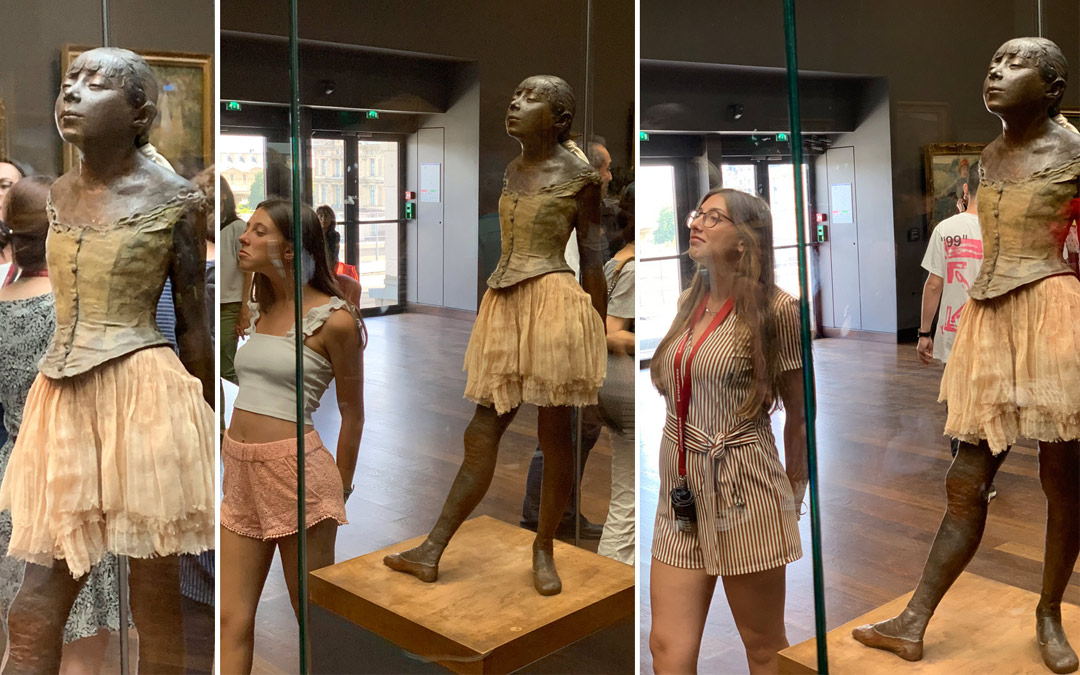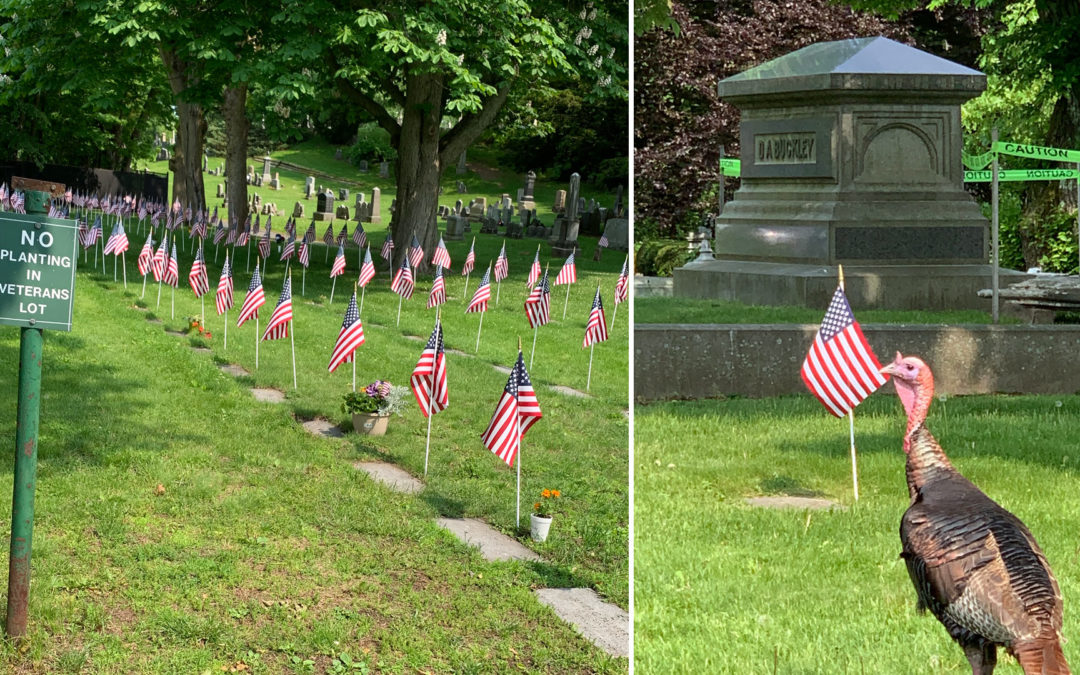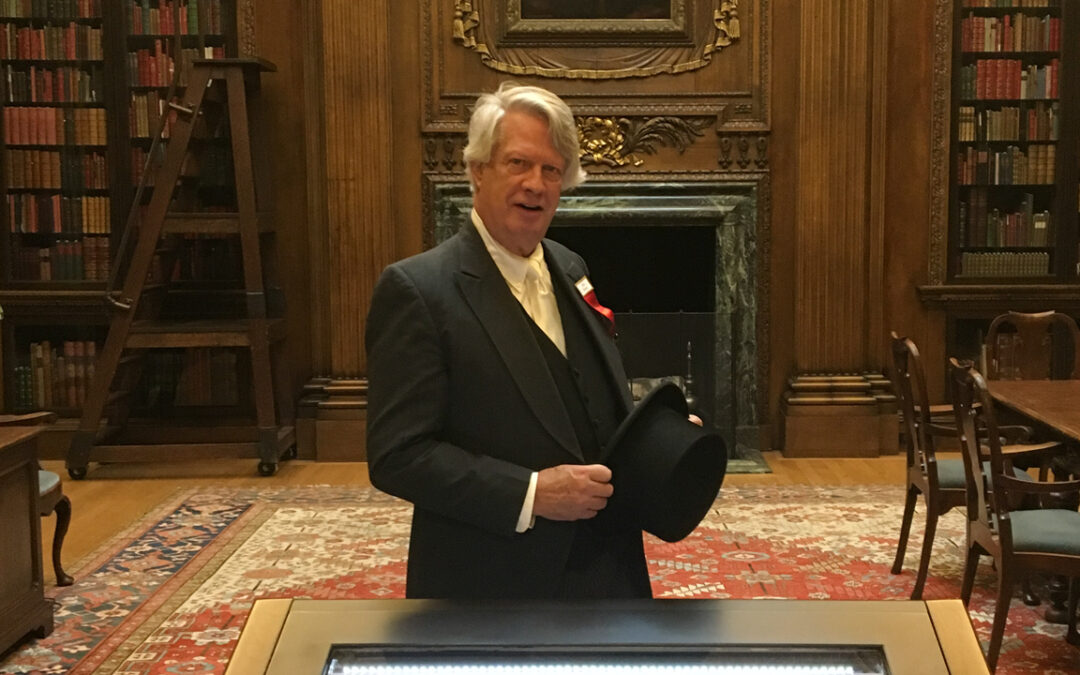
by Robert Bowie, Jr. | Aug 8, 2019 | Featured, Poetry, Travel
As I turned away from Degas’ statuette of a dancer at the Musee D’Orsay in Paris last week, I almost missed the imitators. The imitators were lining up, looking at the statuette and striking a pose. The reaction was not mocking and somehow not disrespectful. The imitators were reacting to a man-made object created out of his imagination. The interaction is what mattered.
When I was in high school, I read a line from W. H. Auden that said “poetry makes nothing happen.” It stopped me in my tracks. It was the late ’60s. I wanted to do things that made things happen. I became a lawyer. I made things happen.
Now I know I misread the line. Auden was making fun of all those things that appear to make things happen but really don’t. Art makes things happen in that it offers the chance to interact with a created object from another person’s imagination.
But why does that matter? It seems that at the center of our existence we travel a number of years in the mundane pursuit of what we need to survive, but art offers a conversation with another who is, or has been, on that same journey. It offers, but does not demand, this conversation.
In the same gallery, hordes of people were moving from picture to picture, cell phones out, photographing the exhibit as they hurried by. They had not accepted the offer. They were just capturing the object.
The imitators had accepted the offer. They were interacting with the Degas’ statuette.
The conversation can happen in many forums but it is always between the artist and the self. It can come through some or all the senses. It can be theoretical. It can come with an artist’s demand for your attention, as with Andy Warhol asking you to notice common objects, but for me it is always a very personal person-to-person communication.
It can also be environmental. On my way home, I noticed the statues in the park and the park in the city as I walk through. The art of the statue inside the art of the park surrounded by the mundane existence of the traffic and commerce of the city.
I found Auden’s quote:
“For poetry makes nothing happen: it survives
In the valley of its making where executives
Would never want to tamper, flows on south
From ranches of isolation and the busy griefs,
Raw towns that we believe and die in; it survives,
A way of happening, a mouth.”
In Memory of W.B.Yeats
(d. Jan. 1939)
He says all this better than I but I had to learn it for myself.

by Robert Bowie, Jr. | Jun 18, 2019 | Featured, Personal
I’m extremely fortunate to have had a class with Elizabeth Bishop, who was one of our great, late 20th Century poets. She taught us that any two poems, no matter where they are from, when placed side-by-side will cause an unintended contrast that will illuminate both. Once grasped, this is an eye-opening idea with endless potentiality for creative thought.
I grew up between two schools, two cemeteries, and Harvard Square. The Cambridge cemetery was relatively flat, had few trees, was wide open, and pretty much existed to hold the military dead of foreign wars and the citizens of that city. In contrast, behind the impenetrable black iron fence and gate of Mount Auburn Cemetery, spread a small and elite universe of acres of hills and valleys with shaded walkways and still ponds, as an arboretum of carefully preserved trees and as an aviary for local and migrating birds. These two cemeteries existed side by side divided only by a single two lane road.
As children we would freely ride our bikes among the military dead in the Cambridge cemetery but we were strictly prohibited from even entering Mount Auburn. It wasn’t a place designed for us. However, when the gates were open adults were permitted to walk among the graves and in its verdant splendor. Mount Auburn rested like a shared understanding of what a patrician heaven might be while the Cambridge Cemetery was a plebeian limbo.
When I visited after last Memorial day the Cambridge cemetery had rows and rows of flags. One at each grave. No one was there except a lone bagpiper striding along one of the empty roads. Unexpectedly, I could find only one flag in all of Mount Auburn and it was guarded by a wild turkey that had become domesticated by the place. There was a quiet urgency as groups of horticulturalists or birdwatchers clustered as they whispered observations to each other.
Miss Bishop, as she called herself, was right. The accident of the unintended contrasts caused by my time and location that day opened up worlds for me about the two cemeteries, about the living generation and the predeceased, as I walked between the four.
by Robert Bowie, Jr. | May 21, 2019 | HAA, Poetry
Last week I presented my ode for the Harvard Alumni Association to keep them laughing. As the Poet Laureate, I love doing this every year. This year, the subject was Harvard Magazine, and my ex-father-in-law, both of which I love.
For Harvard Magazine
(Portrait of Gentleman Jim)
By Robert R. Bowie, Jr. Ab’73
Whenever I became too confident
Of my perfect Harvard education
My ex-father-in-law, concomitant,
Was there to deliver expiation.
His timing was perfect. He’d watch and wait.
He’d set me up and then he’d set me straight.
Let me describe this kind and gentle man:
In profile he was blessed with a perfect
Semi-circular belly and no can.
Perfect as a backlit window silhouette:
A photo I still love and regret.
A photo my ex-wife wouldn’t forget.
A small piece of a small, but sad divorce.
He has ‘passed on’ but I miss the man.
Comfortable with himself. Steady. On course.
Leaning back with a scotch glass in his hand,
“I sell seeds and satisfy farmers’ needs,
Go to church, plant the garden, pull the weeds.”
Every Easter the two of us would go
Outside to smoke illegal Cuban cigars.
He’d get me to tell him what he should know.
He’d always wait until I’d gone too far.
He’d lean back: “Ahh, hoist by your own petard?”
Flick off his ash and say “Harvard-smavard.”
They’re all gone now, his wife, mine and him.
But still up until the very end
I would package and carry up to him
All my old Harvard Magazines and then
He always put them there in the same place,
Next to the kindling and fireplace.
I drove up a month or so before he died.
He so deeply missed his loving wife.
The reconciliations I had tried
Had failed. Love was leaking out of his life.
The door unlocked, sleeping in his chair
With a Harvard Magazine spread out there
Heaving on his perfect snoring belly,
What a perfect find was all of this?
There was food in the ice box from the deli.
I found whiskey and two glasses. I kissed
Him and asked “What’s this you’re reading you fool?”
With a cagey smile: “It ain’t that bad a school.”
Copyright © 2019

by Robert Bowie, Jr. | Jun 20, 2017 | Featured, HAA, Personal
The “Costume” in my case was white tie and tails with a perfect black top hat. The “Set” was the Harvard graduation of last week. The “Plot”: Because of the custom of complete secrecy, I had been told only a few days before that I had been selected to escort James Earl Jones for the afternoon proceedings and to an honorees lunch at Widener Library after the morning ceremonies where he, along with several others, would be given an honorary degree.
Only last month I had seen his performance as the poet in Tennessee William’s Night of the Iguana at the American Repertory Theater and had read about his career, which started with his first appearance on Broadway in 1957 and spans 60 years on stage and screen.
After the honorary degree had been bestowed on him in the morning and those proceedings had ended, Mr. Jones would descend the stage, which is at the foot of Memorial Church, and march with his fellow honorees below the colorful flags of the graduate schools and the undergraduate houses, between the assembled throng of the thousands of applauding viewers to ascend the steps of Widener library and be directed to the periodical room where I would meet him, take his ceremonial cap and gown, unburden him of his framed honorary degree, and provide him with the refreshment of his choice. Then I would facilitate conversation among the other honorees before we took the elevator up to the lunch and thereafter back to the stage for the afternoon speech by Mark Zuckerberg and the closing proceedings.
I arrived early to Widener and made certain I knew exactly what my duties were and traced my steps from the periodicals room where I would meet Mr. Jones, through the elevator exit and entrance to the luncheon and ultimately the path we would take to get back to the stage and become seated for the afternoon proceedings.
But this was a very special moment for me, so I decided that I could entertain Mr. Jones by offering him a slight diversion from our proscribed path, to see the Gutenberg Bible in a private room which contains a portrait of Harrie Widener, for whom the library was named after he died on the Titanic a century ago. I confirmed that I could get into the room and because I was early I asked a solo passerby to randomly photograph me since the proceedings had not started and we were still allowed photographs before the event began. It would be my stage where I could watch James Earl Jones react to the surroundings I have offered him.
But my play went off script and the plot collapsed and, in fact, disappeared. The weather had been awful all morning with a steady drizzle and unexpected gusts of wind that sent the water across the crowds and the stage. Those being honored on the stage, although they were protected by a grand tent still suffering the blasts of wind and rain and the general chill of the morning.
As the proceedings broke up and the ceremonial march to the steps of Widener began, I assumed my position outside of the periodicals room to meet James Earl Jones, but as the others entered through the grand doors and were steered to their escorts there was no sign of him. After all the other honorees had entered and had turned over their robes and diplomas to their escorts, I went to one of the police officers guarding the ceremonies and started a flurry of walkie-talkie conversations in search of Mr. James Earl Jones. As the others took the elevator up to lunch, someone reported back that Mr. Jones had been worn out by the weather and the cold during the morning proceedings and had asked to go directly from the stage to his hotel room.
I never met him and I have only that photograph of the Gutenberg Bible in the foreground and the portrait of Harrie Widener in the background with a slightly rotund overdressed older man between them, and the realization that dreams can be memorialized in still photographs but plot cannot be deprived of action.



